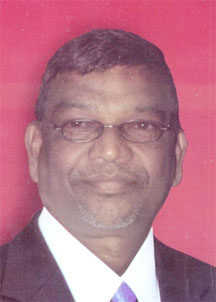Following recent fatalities at mining operations, Labour Minister Dr Nanda Kishore Gopaul says the relaxed approach to Occupational Safety and Health (OSH) among persons operating in the industry may be responsible for accidents.
In the feature address at the opening of a three-day workshop on OSH in the mining sector on Tuesday, Gopaul said that increased activities in mining necessitates greater vigilance and he urged stakeholders in the sector, especially those working in the fields, to make safety their personal responsibility.
“Industrial accidents are extremely costly to employers and the state, but the human cost to workers and their families, particularly in the case of fatalities [cannot be quantified] and demands greater responsibility,” the minister was quoted as saying in a release from his ministry.

“This seminar comes at an opportune moment to edify people and emphasise the need to ensure that the rules of safety are observed. …we need to minimise the number of accidents, altogether eliminate the fatalities due to industrial accidents,” he added.
The workshop is being facilitated by mining expert Robert Lambeth and Dr. Yuka Ujita, Occupational Safety and Health Specialist of the ILO Office in the Caribbean. According to Lambeth, the workshop would use a collaborative approach to develop an OSH road map for the mining sector, making it applicable to the local environment. The training, he said, is aimed primarily at workers employed at mining sites.
The workshop, which was described as the first of its kind in the Caribbean, includes stakeholders from the diamond, gold, bauxite, magnesium and quarrying industries as well as labour inspectors, union officials, staff from the Guyana Geology and Mines Commission and representatives from the Surinamese mining sector. It is expected that the ILO would use it as a model for other Caribbean countries and Latin America. The workshop is being hosted by the Labour Ministry with support from the ILO through the decent work programme.
According to Gopaul, the ministry’s mission is not to wantonly prosecute persons who violate the OSH laws, but to work with them to ensure the safety and health rules are observed and the workplace is safe. Further, he invited entities that needed assistance to meet these obligations to seek the services of the Labour Department. “Collaboration is important in ensuring safety and health in the workplace, so let us team up,” he said. Participants at the workshop were also urged to engage in the discussions and to share their knowledge with others.
Gopaul said Guyana has enacted a number of laws and is preparing supporting regulations, with input from various stakeholders represented on the Tripartite Committee, reflecting an inclusive approach of social partners in crafting and enacting guidelines to protect employers and employees. He said too that the Labour Department has been able to assist many workers seeking redress before the courts for employment issues.
However, he noted that the objective is to have harmonious industrial relations and as a result he called on employers to fulfil their obligations to employees so that the legal system will be a last resort.
In his presentation, Joslyn McKenzie, Permanent Secretary at the Ministry of Natural Resources and the Environment, said statistics indicate that mining contributed to 11% of Guyana’s Gross Domestic Product and 53% of the foreign exchange last year. He also noted that the country has already surpassed last year’s declaration of 363,000 ounces of gold and is on target to attain the 400,000 ounces declaration target set for 2012. These amounts are mined primarily by small and medium scale miners.
There are about 6000 local and international operators in the mining industry, employing thousands of workers and these figures are expected to climb as the price for gold increases, making it necessary for heightened vigilance of OSH standards at mining pits, and in the areas of transportation and mechanisation.
McKenzie stressed that while the authorities are responsible for enforcing OSH guidelines, the onus is on employers and employees to ensure they wear protective gear and observe safety measures. He also cautioned machine operators against taking jobs unless they had been trained.
Meanwhile, Dr Ujita underscored the importance of safeguarding the human capital in the mining industry for sustainable development, since it is key to both economic and social development. She said that safety and health at work is a fundamental human right and this could be achieved through decent work.





